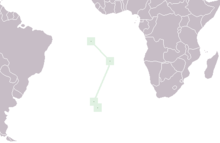
Saint Helena is one of the three constituent parts of Saint Helena, Ascension and Tristan da Cunha, a remote British overseas territory.
Saint Helena, Ascension and Tristan da Cunha are British Overseas Territories in the south Atlantic Ocean.
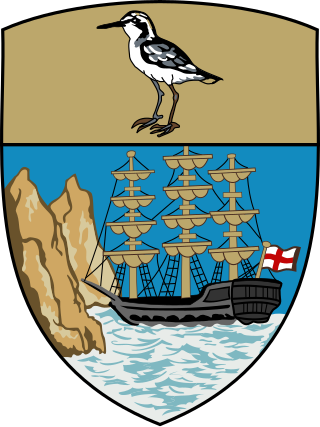
Politics of Saint Helena takes place in a framework of limited self-government as a dependent territory of the United Kingdom, whereby the governor is the head of government. Saint Helena, an island in the southern Atlantic Ocean, is a part of the British overseas territory of Saint Helena, Ascension and Tristan da Cunha.
This article deals with traffic in Saint Helena, Ascension and Tristan da Cunha, that is all forms of traffic in the British overseas territory of Saint Helena, Ascension and Tristan da Cunha.

.sh is the Internet country code top-level domain (ccTLD) for the British Overseas Territory of Saint Helena, Ascension and Tristan da Cunha, although it is primarily used in Saint Helena. Registrations of internationalized domain names are also accepted.

The Governor of Saint Helena is the representative of the monarch in Saint Helena, a constituent part of the British Overseas Territory of Saint Helena, Ascension and Tristan da Cunha. The governor is appointed by the monarch on the advice of the British government. The current governor of Saint Helena has been Nigel Phillips since 13 August 2022.
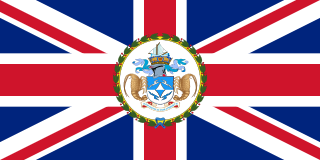
The governor of Tristan de Cunha is the representative of the monarch in Tristan da Cunha, a constituent part of the British Overseas Territory of Saint Helena, Ascension and Tristan da Cunha. The governor is appointed by the monarch on the advice of the British government. The role of the governor is to act as the de facto head of state.

The Governor of Ascension is the representative of the monarch in Ascension Island, a constituent part of the British Overseas Territory of Saint Helena, Ascension and Tristan da Cunha. He is appointed by the monarch on the advice of the British government, his role is to act as the de facto head of state.

The following outline is provided as an overview of and topical guide to Saint Helena:
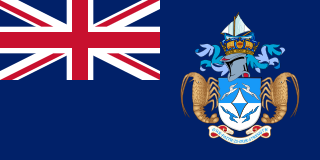
The following outline is provided as an overview of and topical guide to Tristan da Cunha:

Ascension Island is an isolated volcanic island, 7°56′ south of the Equator in the South Atlantic Ocean. It is about 960 miles (1,540 km) from the coast of Africa and 1,400 miles (2,300 km) from the coast of South America. It is governed as part of the British Overseas Territory of Saint Helena, Ascension and Tristan da Cunha, of which the main island, Saint Helena, is around 800 miles (1,300 km) to the southeast. The territory also includes the sparsely populated Tristan da Cunha archipelago, 2,000 miles (3,200 km) to the south, about halfway to the Antarctic Circle.

Saint Helena, Ascension and Tristan da Cunha is a British Overseas Territory located in the South Atlantic and consisting of the island of Saint Helena, Ascension Island, and the archipelago of Tristan da Cunha. Its name was Saint Helena and Dependencies until 1 September 2009, when a new constitution came into force, giving the three islands equal status as three territories, with a grouping under the Crown.

Saint Helena, Ascension and Tristan da Cunha, a British Overseas Territory, does not have its own flag; however, the three administrative divisions do have their own flags:
Saint Helena, Ascension and Tristan da Cunha is a British Overseas Territory in the South Atlantic, consisting of the island of Saint Helena, Ascension Island and the archipelago of Tristan da Cunha including Gough Island. Their communications provision includes dedicated radio and television stations, and telecommunications infrastructure.

The politics of Saint Helena, Ascension and Tristan da Cunha operate under the jurisdiction of the government of the United Kingdom. The three parts of the territory—Saint Helena, Ascension Island and Tristan da Cunha—effectively form an asymmetric federacy and collectively constitute one of United Kingdom's fourteen overseas territories.

The Ascension Island Council is an elected body that provides advice to the Administrator of Ascension Island on matters relating to the governance of Ascension Island. The Council is made up of either five or seven Councillors, depending on the number of candidates standing for an election, and its meetings are chaired by the Administrator. The Island's constitution requires the Governor and Administrator to consult with the Council when making laws for Ascension Island. The Governor and Administrator are not bound to accept the advice of the Council but the Council has the right of appeal to the British Government.

Among the fourteen British Overseas Territories, eight – Akrotiri and Dhekelia, the British Antarctic Territory, the British Indian Ocean Territory, the Falkland Islands, Gibraltar, the Pitcairn Islands, Saint Helena, Ascension and Tristan da Cunha, and South Georgia and the South Sandwich Islands – recognise and perform same-sex marriages. In the Sovereign Base Areas of Akrotiri and Dhekelia, only British military and civilian personnel can enter into same-sex marriages and civil partnerships.
Same-sex marriage has been legal in Saint Helena, Ascension and Tristan da Cunha since 2017. An ordinance to open marriage to same-sex couples in Saint Helena was passed by the Legislative Council in a 9–2 vote on 19 December 2017. It went into force the following day, and the first same-sex marriage was performed on 31 December 2018. Same-sex couples have also been able to marry on Ascension Island since 1 January 2017 and in Tristan da Cunha since 4 August 2017.

The St Helena, Ascension and Tristan da Cunha Constitution Order 2009 is a Statutory Instrument of the Parliament of the United Kingdom direct from the Privy Council of the United Kingdom that made legal provision for a new Constitution for the British Overseas Territory of St Helena, Ascension and Tristan da Cunha. Before the Constitution came into force, the territory was formally known as St Helena and Dependencies under the provisions of the St. Helena Constitution Order 1988, which the 2009 Order replaces. The new Constitution gave each of the main islands equal status, ending the status of Ascension Island and Tristan da Cunha as dependencies of Saint Helena within the territory. However, it retains a single Governor who is based in Jamestown, a single legal system and Administrators for Ascension and Tristan da Cunha. It came into force on 1 September 2009.
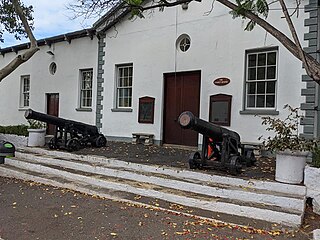
St Helena Magistrates' Court is a Magistrates' Court in Jamestown, Saint Helena, which is part of the British Overseas Territory of Saint Helena, Ascension and Tristan da Cunha. It is a court of summary jurisdiction and one of three courts on the island, the others being the Saint Helena Supreme Court, the Court of Appeal and the Juvenile Court. The Magistrates' Court has jurisdiction to try any offence which carries a sentence of fewer than 14 years imprisonment. The Court can pass a maximum sentence of 18 months imprisonment when constituted of a bench of Lay Magistrates or 5 years if the case is heard by the Chief Magistrate.
